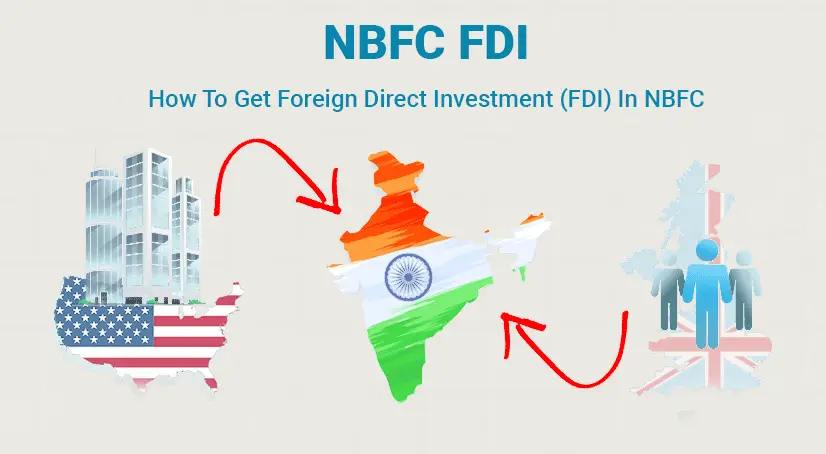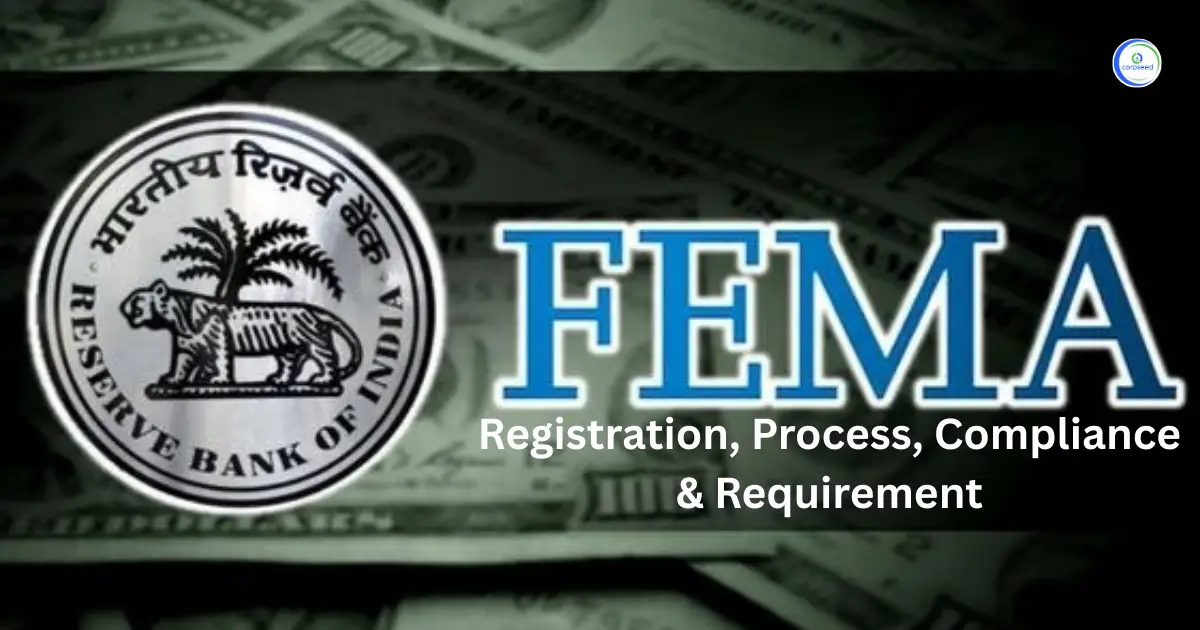Introduction: Foreign Direct Investment In NBFC
Non-Banking Financial Companies or NBFCs are the type of companies that are involved in the business of acquisition of shares, stock, loans and advances, insurance business or chit business, bonds hire-purchase but don’t include any institution whose primary business involves industrial activity or the sale, agriculture, purchase or construction of the immovable property. Ongoing with the liberalization of the overseas investments rule the government has allowed a Hundred Percent Foreign Direct Investments in ‘other financial services’ carried out by the non-banking finance companies. The government has eased its policy for Foreign Direct Investment in NBFC.
Table of Contents
- Introduction: Foreign Direct Investment In NBFC
- Law Governing The Foreign Investments In Nbfc
- Foreign Loans And NBFC
- Foreign Investments Modes
- Maturity Period And Interest
- Procedure of Taking Foreign Loans
- Conversion of Loans Into Equity
- Consequences of Violation Of ECB Regulations
- FDI Policy For NBFC
- Changes Made In FDI Policy
--------------Blog Contact Form-------------
The financial services shall involve practices that are synchronized by any financial sector regulator such as Securities and the government in the same regard may inform Exchange Board of India, Reserve Bank of India, Pension Fund Regulatory and Development Authority, IRDA, National Housing Bank or any other financial sector regulator as. However, the investment shall be subject to conditions such as minimum capitalization norms mentioned by the regulator or government agency concerned. The Finance Minister Arun Jaitley in his speech had mentioned that the FDI shall be permitted beyond the eighteen particular NBFC activities in the repeated route in other activities that are regulated by financial sector regulators.
Law Governing The Foreign Investments In Nbfc
The provisions regarding the foreign exchange are regulated by the FEMA, 2000 and the operations of NBFCs are regulated by the RBI within the ambit of the RBI Regulation Act 1934. As issued by the Government hundred percent FDI is allowed in NBFCs subject to the minimum capitalization norms
The provisions relating to foreign loans are governed by the Foreign Exchange Management Act, 1999 and Foreign Exchange Management (Borrowing and Lending in Foreign Exchange) Regulation, 2000 and the RBI regulations.
Foreign Loans And NBFC
Loans from foreign institutions are considered as External Commercial Borrowings. These loans could be obtained from either foreign banks or foreign financial institutions. External Commercial Banks can also be acquired in the form of bonds, preference shares, and debenture. These will also comprise of a loan from a foreign shareholder who holds at least twenty five percent of the shares of the borrower company.
It's only in some particular sectors where the Reserve Bank of India allows ECBs to be acquired after satisfying the essential requirements. There is a need to comply with the procedural necessities to acquire foreign loans in an NBFC. In order to avail the loans, no RBI approval is needed.
Foreign Investments Modes
In an NBFC, foreign investment can be acquired not only in the form of liquid currencies but also by the way of exchange of shares, conversion of loans to share, exchange of some skillsets, etc.
Maturity Period And Interest
On the subject of the ECB, there are many rules and restrictions contained in the Foreign Exchange Management Regulation. There are certain explicit rules broached in reference to the maturity period and the amount of interest to be paid. The external commercial borrowing cost involves the interest charged by the bank, other fees and expenses paid in foreign loans. It must be in the ambit of the limit which is calculated in regards to a reference rate called the LIBOR or London Interbank Offered Rate.
In case of a loan whose average maturity period is three to five years, its interest would be three point five percent over six months the LIBOR and
In case of a loan that will be matured after more than five years its interest ceiling would be plus five percent over the six month LIBOR.
Procedure of Taking Foreign Loans
The NBFCs are needed to submit form eighty-three to the Authorized Dealer bank to acquire the Loan Registration Number for obtaining foreign loans under the automatic route. The Loan Registration Number has to be verified by a company secretary or chartered accountant.
Then the AD bank shall forward a copy of from eighty-three to the Department of Statistics and Information Management of Reserve Bank India. After the allotment of the LRN number, the loan is taken.
Conversion of Loans Into Equity
In the scenario when the NBFC is not able to repay its debts then after acquiring the assent of the lender it can change some or all of its debts into equity. If, it shall be guaranteed that the shares are issued under the FEMA pricing rules when a company is willing to convert the loan into equity.
Consequences of Violation Of ECB Regulations
In case if anybody fails to comply with the provisions of the ECB regulation the punishment shall be up to thrice of the amount involved in accordance with the section 15 of the Foreign Exchange Management Act.
The corporate entities that are under the investigation by the Reserve Bank of India can only obtain foreign loans under the sanctioned route. If in case the breach is continuous then an additional penalty of Rs. Fifty thousand shall be paid per day. If in case of an unintentional breach, it can be further corrected by compounding with RBI, which might help in getting a much lower penalty.
FDI Policy For NBFC
In the case of NBFC, foreign investment is allowed under the automatic route as per the FDI rule. Under the automatic route, prior to drafting the anticipated investment, there is no need for Foreign Investment Promotion Board or RBI approval. Under the automatic route up to a hundred percent, foreign investments are permitted without the prior sanction of the foreign investment promotion board.
Every foreign deal is needed to be routed only by the way of entities licensed by the RBI as per section 10 of FEMA.
Foreign investment was allowed under automatic route only in the following eighteen approved non-banking financial service activities.
- Merchant Banking
- Underwriting
- Portfolio Management Services
- Stock Broking
- Asset Management
- Venture Capital
- Custodial Services
- Factoring
- Leasing & Finance
- Housing Finance
- Credit Card Business
- Micro Credit
- Rural Credit
- Non-fund based activities
- Investment Advisory Services
- Financial Consultancy
- Forex Broking
- Credit Rating Agencies
- Money Changing Business
In the above-mentioned activities, foreign investment in non-banking sectors is allowed under the automatic route is subject to conformity with the minimum capitalization norms.
After the establishment of NBFC with the required capital under the Foreign Exchange Management Regulation, following diversification either by the way of an existing company or through downstream NBFCs can be undertaken without any further approval.
- Foreign Investments Subject To Minimum Capitalization Norms
- The US point five million dollars for foreign capital up to fifty percent to be brought open.
- The US five million dollars for foreign capital more than fifty percent and up to seventy-five percent to be brought open.
- Fifty million for foreign capital more than seventy-five percent out of which seven point five million dollars to be brought up front and the balance in twenty-four months.
- The Non-banking financial companies having foreign investment more than seventy-five percent and up to a hundred percent, and with a minimum capitalization of fifty million dollars, can set up step down subsidiaries for particular NBFC activities, without any restriction on the number of operating subsidiaries and without bringing additional capital.
- Joint Venture operating NBFCs that have seventy-five percent or less than seventy-five percent foreign investment can also set up subsidiaries for undertaking other NBFC activities, subject to the subsidiaries also complying with the applicable minimum capitalization norm mentioned above.
- Non- Fund based activities: The US point five million dollars to be brought open for all allowed non-fund based NBFCs irrespective of the level of foreign investment.
- Subject to certain conditions
- For such a set up it would not be permitted to either set up any supplementary for any other activity nor can take part in the equity of an NBFC holding company. The above-stated capitalization rules apply to every downstream supplementary engaging in NBFC activities except where its parent company already has more than seventy-five percent of the foreign investment.
Changes Made In FDI Policy
In the RBI notification dated 9 September 2016 following main relaxations have been granted:
- In the case of NBFCs hundred percent, FDI through the automatic route is now allowed in the “Other Financial Services” beyond the eighteen particular activities.
- Provided that the specified activities are regulated by financial sector regulators such as RBI, SEBI, Pension Fund Regulatory Authority of India, etc.
- Under Foreign Direct Investment Policy, additional capitalization rules associated with foreign ownership have been eliminated, and thereby the capitalization rules have been aligned with those approved by the significant regulators governing these activities. Under the foreign direct investment Policy, minimum capitalization rules have been removed as most of the regulators have already fixed minimum capitalization rules.
- Unregulated NBFCs which are not governed by any financial sector regulators will need prior government sanction.
- Due to the comparatively easier and faster approval of loans with favorable interest rates, rising FDI will be beneficial for the entity. This step of the government is expected to provide a required boost to this sector.
This portion of the site is for informational purposes only. The content is not legal advice. The statements and opinions are the expression of author, not corpseed, and have not been evaluated by corpseed for accuracy, completeness, or changes in the law.
BOOK A FREE CONSULTATION
Get help from an experienced legal adviser. Schedule your consultation at a time that works for you and it's absolutely FREE.









